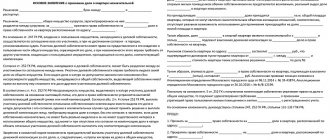Home » Housing disputes » Donation of a privatized share in an apartment to a relative
3
The privatized share (or the apartment as a whole) is the full property of the owner and therefore he can give it away, sell it, rent it out, pledge it, and so on, without any problems. The fact that the apartment was not previously privatized does not play any role in this case.
What is a share
A share in an apartment is a conditional part of real estate that belongs to a specific person.
Example : If an apartment was privatized by a family of 4 people, each of them will receive exactly 1/4 of the property (25%) as their own. This 25% will be considered a share.
There are two main types of shares:
- Selected in kind . This is a separate room in a multi-room apartment. The closest analogue and the simplest example: a communal apartment. In it, each family owns a separate living space, which, apart from the common corridor, is not connected with the others. The kitchen, bathroom and toilet are usually shared property and are used on a rotating/scheduled basis.
- Uncertain . This share option is typical for ordinary apartments in which standard families live. Formally, each of the owners has the right to a certain number of square meters, but in fact it is impossible to dispose of, say, only that part of the apartment where there is a sofa and a TV and not allow other residents there. Thus, the share is, as it were, there, a person can dispose of it, but cannot use it separately from the rest of the housing.
Donating/selling/renting/pledge an indefinite share is possible only with the consent of the other owners of the premises.
Who can I give or transfer an apartment to?
You can give or transfer a share in a privatized apartment (or its entirety) to almost any person. These can be either close relatives (husband, wife, children, parents) or complete strangers.
Not everyone can donate a share or an entire apartment. This is prohibited for persons under the age of majority, as well as for people declared incompetent. This rule was introduced in order to exclude situations with the transfer of real estate fraudulently or in a state where the owner simply does not understand what exactly he is doing.
To whom can you not give or transfer a privatized share in an apartment?
There are certain categories of persons who do not have the right to accept a share in an apartment (or its entirety) as a gift in accordance with Article 575 of the Civil Code of the Russian Federation. These include:
- Bank employees.
- Employees of the medical, social, educational or any other public sector.
- Workers in the public service.
This rule was introduced to combat bribes and corruption. It is assumed that in this way the possibility of transferring valuable property, supposedly voluntarily, but in fact - in the form of a bribe, is excluded.
Among other things, you cannot give a share in an apartment to legal entities. They can receive various real estate objects solely within the framework of a will/inheritance or a purchase and sale agreement.
Features of re-registering a share in an apartment to a relative
In contrast to a single right to property, ownership of a share in some circumstances requires the agreement of the transaction with the remaining owners of the property. The fact that the recipient of part of the property is a close or distant relative does not in any way affect the course of the legal procedure. It is necessary to take into account the features of the chosen registration method and comply with the requirements of the law so that the re-registration is successful and a loved one can become the owner of the property.
The status of “share in real estate” is determined on the basis of Art. 244 of the Civil Code of the Russian Federation, which considers options for registering common or shared ownership. A share is a part of property divided into several owners, with the retention of the right of ownership, use, and disposal. In the absence of a share allocated in kind, the distribution goes evenly to all co-owners of the object.
Any of the persons recognized as a co-owner of an apartment or other real estate has the right to order the transfer of their volume of property to another person, including relatives. In some cases, in order to successfully complete a transaction, you will need to go through an additional approval procedure with the other owners of the property. The presence or absence of family ties can only affect the cost of re-registration.
The following options for transferring part of the real estate are provided:
- barter agreement;
- deed of gift;
- bill of sale.
The consequences and nuances of transaction execution depend on the choice of transaction type.
For purchase and sale
To re-register part of the apartment to your relative, they proceed from the basic provisions of civil law, paragraph 7 of Chapter. 30 State Civil Code of the Russian Federation.
The law establishes that paid transactions are carried out only after agreement with the other owners of the property. The seller is obliged to offer his meters to the other owners of the property, and upon receiving a written refusal from them or ignoring a documented offer, formalize the transaction with any other contender.
Mena
One of the options for rewriting a share in an apartment is an exchange. The grounds for concluding an agreement with the exchange of property are established in the Civil Code of the Russian Federation (Chapter 31). If the requirements for the procedure are met, the registration authority will have no reason to refuse to re-register the share.
Gift deed
Most often, transactions between relatives are carried out free of charge, i.e. no charge. When concluding a deed of gift, the right to transfer one’s property in favor of another person cannot be canceled.
If the share is transferred under a gift agreement, close relatives are exempt from paying tax. When completing the transaction, you will have to confirm the presence of a close family relationship.
The donation agreement frees you from the need to coordinate the transaction with the co-owners of the property, however, you should use this re-registration option only under truly gratuitous transfer conditions. By signing a deed of gift to a stranger with the expectation of receiving the amount as if selling, the former owner risks being deceived. To cancel the transaction, it will be necessary to establish that both parties deliberately made a substitution.
Sample donation agreement
: Donation agreement. Sample (18.5 KiB, 2,426 hits)
Sample agreement for donating a share of an apartment to a minor child
: Sample agreement for donating a share of an apartment to a minor child (71.0 KiB, 1,008 hits)
If the share is gifted to a non-family member, a 13 percent tax will be required on the full assessed value of the property.
Is it necessary to notarize the donation transaction?
No, this is not necessary. Since 1995, any owner of a share who has the consent of the other residents of the apartment has the full right to transfer his share to any other person (except for those who cannot be given a share in the apartment) without contacting a notary. At the same time, this procedure has not been cancelled. That is, it is not necessary, but it is desirable. And that's why:
- The notary will check the legal capacity of all parties, the gift agreement itself and any other features of the transaction for errors or other factors due to which the agreement could subsequently be invalidated.
- A notary can draw up an agreement himself or provide assistance in its preparation. This greatly simplifies and speeds up the procedure.
- The notary certifies the contract and, as a result, thereby confirms the fact that there is no fraud here.
Yes, the services of a notary office can cost a pretty penny, but they will help eliminate possible problems in the future. Nevertheless, the person himself can decide whether this is necessary or not. Payment for notary services can be made by both the donor and the donee, or even divided between them in any ratio.
Special conditions of donation
A relative acting in the status of a donee is not obliged to accept a gift; there is no guarantee that the donor’s ideas initially suit the donee or were agreed upon with him. It is not uncommon for a situation where a gift of real estate is not a benefit, but a serious burden and a significant burden on a person burdened with family relationships.
If a relative unexpectedly finds out that an “immovable” but unexpected and clearly inappropriate gift is being made to him, he can refuse it at any time before registering the transfer of rights to him. The agreement will not take place. Such refusal is made in writing.
The donor may not fulfill the contract when significant circumstances unexpectedly arise:
- the situation or health of the donor has deteriorated, which radically changes the possibilities of making a gift;
- an unlawful act has been committed against the donor or his relatives and the person to whom it was planned to donate the rights to the real estate is suspected.
Any option for terminating the contract does not give the recipient the right to demand compensation for losses. Actually, in such a situation there is no gift, no giver, no recipient.
The rules and provisions of the contract and additional agreements are confidential and not subject to disclosure.
A characteristic feature of donation is that significant material benefits are transferred from the possession of one person to the property of another person free of charge. The state's interest in such agreements is understandable and objectively justified.
The factor of the real possibility of covering up selfish interests (registering the sale of real estate under the guise of a gift, for example) is obvious and competent government agencies are studying this kind of situations.
But the psychological aspect and the specifics of family relationships in the context of the gratuitous movement of material goods should still be kept in mind. For example, not only the donee can strive to receive a gift and go out of his way until the right is formalized, and then neglect the donor in any unsightly form.
Achieving an unlawful goal is not excluded on the part of the donor. Without being able to sell property, for example, there is a lawsuit going on, so any movement of material wealth can be blocked according to procedural law, be it civil or criminal proceedings. But gift deeds are less visible in terms of moving tangible things, including real estate rights. Giving children their own apartment is a noble gift! For example, to offset alimony that was not paid on time for the entire time when it should have been done.
Relatives can come up with a sufficient number of options for using gift agreements. And it’s good when these options exist in accordance with the rules of law regarding the movement of material goods and established moral values.
How to transfer or gift a share in a privatized apartment to a relative
To ensure that the transfer/donation of a share in a privatized apartment occurs according to the rules and it is more difficult (or even impossible) to challenge in the future, you need to follow the instructions presented below.
Procedure
- Agree with the remaining residents and obtain their consent to transfer the share in the privatized apartment.
- Decide whether notary services will be used and which party will pay for them.
- Draw up a gift agreement (deed of gift).
- Sign the contract.
- The new owner with the contract must independently re-register ownership. At the moment, this is confirmed by an extract from the Unified State Register, which is issued by Rosreestr.
Procedure
The procedure is not particularly complicated. If both parties and all other residents are not against the transfer of shares, then no problem. On the other hand, if at least one is against it, then the donation will not be possible.
The issue of using a notary is also discussed at the initial stage of the transaction. In practice, if a close relative with whom normal relations have been established becomes the new owner, then there is little point in this. But when giving gifts to distant relatives or third parties, it is better to play it safe.
Drawing up a contract is not difficult. To do this, you can use the sample below.
Allocation of shares
According to the laws currently in force in the Russian Federation, real estate can have two forms of ownership:
- Shared ownership . It presupposes the common ownership of several persons, the share of each is established.
- Common property. With this form, the specific size of shares is not determined.
Citizens who participated in privatization at its very beginning, in the 90s, as a rule, received contracts in their hands, which stated that the apartment was transferred to joint ownership.
Currently, the legislation has changed, and when a privatization agreement is drawn up with several persons, housing is transferred to common shared ownership. What about those whose apartment remains registered as joint ownership, but circumstances arise when this needs to be changed? The allocation of a share in a privatized apartment is possible and provided for by law.
In this situation there are two options:
- Allocation of shares by agreement of the parties. If there are no disagreements between the owners regarding the distribution of shares, then the property can be divided between them by agreement. This is provided for by Article 252 of the Civil Code of the Russian Federation. To draw up such an agreement, you need to contact a notary who will help draw it up and certify it.
The certified agreement must be registered with Rosreestr. Now each owner knows his share in the property and can dispose of it at his own request, without violating the rights of other owners. In this case, there is no division of personal accounts, since ownership of the apartment still remains common.
- Allocation of shares by court. If agreement is not reached between the owners, then in order to divide the shares it is necessary to apply to the judicial authorities with an application. A plan of the apartment must be attached to the claim, and notes must be made on it about exactly how the division is supposed to be carried out.
It determines whether the allocation of shares in kind is possible . The court decision is made on the basis of the commission’s conclusion. In addition, the issue of common areas in the apartment can be resolved in court.
If the allocation is made, each of the owners will need to draw up new technical documents for their part and register ownership of it. Now, if desired, any of the owners can sell their room.
But you should first notify other owners about this, since:
- their consent certified by a notary is required;
- they are given first right of redemption.
If there are no interested parties among them, and consent is not given, then you should send each of them a registered letter with notification and an inventory, which should contain an offer to buy out the share, cost and other conditions, if any.
Donation agreement for a privatized apartment to a relative
A gift agreement (deed of gift) is the main and almost the only document that confirms the fact of transfer of a share in a privatized apartment to a relative. It is logical that it must be drawn up in full compliance with the legal requirements for such documents.
Form, content
The contract must contain the following elements:
- Date and place of signing.
- Data of both parties (donor and recipient).
- Information about the apartment.
- Indication of the title documents on the basis of which the donor has the right of ownership to a share in the privatized apartment (usually a privatization agreement).
- A note about existing arrests, encumbrances or other restrictions.
Sample
Legal formalities of donation
A written document is only a promise to give. Only registration of the fact of donation in Rosreestr assigns the new owner to the real estate donated to him.
After completion of the formalities, the owner of the gift becomes exclusively the donee, and he makes decisions. The donor should take this into account, since the desire to continue living in the apartment may be limited or completely terminated. When donating, you can keep part of the share in the real estate to avoid unforeseen options. For example, only 97/100 of the share goes to the donee, and the rest will be bequeathed.
Thus, how to donate your share in a privatized apartment is quite simple, but it is better to choose the option through a notary, providing him with:
- confirmation of eligibility;
- certificate (house book).
By paying for his services, you can get the desired result: the right was transferred to the relative free of charge, that is, the real estate was donated in the manner prescribed by law.
It is recommended to provide for the return of the gift back, for example, on good grounds if the donor outlives the person to whom he gave it.
Documents are prepared according to the number of participating persons and the cadastral chamber. If you choose the option without a notary, then it makes more sense to provide the package of documents directly to the initiator himself. The applicant receives a receipt indicating the registration period and the time of receipt of new documents. The work is usually completed in ten days.
You can submit documents via the Internet in electronic format, for example, directly on the Rosreestr website. Such registration is preliminary in nature; actual papers will need to be submitted on the day the extract is issued.
Documentation
When drawing up a contract, you must use the following documents. It is recommended that they be attached to this agreement. In addition, the notary will need these papers, provided that the parties use his services:
- Passports of the parties (copies and originals).
- Any documents that confirm the existence of family ties, if any.
- An extract from the Unified State Register of Real Estate stating that this share actually belongs to the donor.
- Extract from the house register. It is needed in order to determine who else owns the housing, the share of which is being donated.
- Power of attorney for the representative and his passport (if required).
- If the share belongs to a person who is married, the consent of the spouse will be additionally required.
State duty, expenses, taxes
Here a lot depends on who, to whom and in what amount transfers. Let's consider the main types of expenses and their size:
| Type of expenses | Sum |
| Notary services (if required) | About 5000 rubles. There are no specific amounts or requirements, everything is individual. |
| State duty | 2000 rubles*share (see the example below for more details). |
| Extract from the Unified State Register of Real Estate | From 300 rubles. |
| Extract from the house register | From 200 rubles. |
| Personal income tax for residents of the Russian Federation | 13% of the cadastral value |
| Personal income tax for non-residents of the Russian Federation | 30% of the cadastral value |
Example of calculating the amount of expenses : One of the family members decided to transfer a share in a privatized apartment to a relative. Its share is 50% of the entire apartment. The procedure will be completed through a notary, the cost of which will be 5,000 rubles. The state fee for registering property rights in this case is 2000 * 0.5 (50% of the entire apartment) = 1000 rubles. For the transaction, an extract from the Unified State Register and the house register is required. This is another 300+200=500 rubles. Thus, the procedure will cost 5000+1000+500=6500 rubles. If the donee were not a relative, he would have to pay another 13% of the cadastral value of the received share as tax (or 30% if he is not a resident of the Russian Federation). Let's assume that the cadastral value is 1,000,000 rubles. The share is 50%, its total price is 500,000 rubles. 13% from here is 65,000 rubles. 30% from here is 150,000 rubles.
Draw up a will - from 6100 rubles
In this case, you will have to go to a notary to certify the will. It won't work without a notary.
In addition, after your grandparents die, you will have to pay a notary fee to take over the inheritance. Now it costs 0.6% of the cadastral value of the apartment, but not less than 4,500 rubles if the heir and testator are close relatives. This is exactly your case: according to the law, you are close relatives.
In addition, you will have to collect documents for inheritance:
- Death certificate in original.
- The original will with a notary's note that it has not been revoked or changed.
- A document from which the place of registration of the deceased will be visible: a certificate of his last place of residence, an extract from the house register or from a personal account. We also need originals.
- Title documents for the apartment: purchase and sale agreement, privatization or donation.
Probate costs
| Certification of the will | 1600 R |
| Entry into inheritance | Not less than 4500 R or 0.6% of the cadastral value |
For example, if an apartment costs 9 million rubles, you will have to pay 54 thousand rubles just for inheritance.
Consequences. There are both pros and cons here:
Is it possible to cancel a deed of gift?
A deed of gift (donation agreement) can be considered illegal and invalid in accordance with Article 578 of the Civil Code of the Russian Federation, but only under certain conditions:
- The deal was concluded under pressure/threats.
- The donor was injured or even lost his life due to the deliberate actions of the recipient.
- As a result of the transaction, a certain non-property value, important for the donor, was transferred to the recipient and there is a threat of its destruction.
- The transaction is fictitious and fraudulent.
Among other things, the gift agreement may provide for a clause on the return of the object of donation to the donor in the event that he survives the recipient.
Despite the fact that the donation procedure is not particularly complicated, problems often arise related to intentional or unintentional violations of the law. In theory, they can lead to the transaction being declared invalid. This problem can be eliminated with the help of our experienced lawyers. At a free consultation, specialists will clarify the main controversial issues and can act as representatives of one side or another.
FREE CONSULTATIONS are available for you! If you want to solve exactly your problem, then
:
- describe your situation to a lawyer in an online chat;
- write a question in the form below;
- call Moscow and Moscow region
- call St. Petersburg and region
Save or share the link on social networks
(
1 ratings, average: 5.00 out of 5)
Author of the article
Natalya Fomicheva
Website expert lawyer. 10 years of experience. Inheritance matters. Family disputes. Housing and land law.
Ask a question Author's rating
Articles written
513
- FREE for a lawyer!
Write your question, our lawyer will prepare an answer for FREE and call you back in 5 minutes.
By submitting data you agree to the Consent to PD processing, PD Processing Policy and User Agreement
Useful information on the topic
3
Eviction from official residential premises
A certain (considerable) category of citizens of the Russian Federation lives in official housing. At…
4
Can they be evicted from an apartment if there is no other housing?
Forced eviction from a residential premises is an unpleasant phenomenon, one might say...
1
Privatization of land
What is land privatization? This is the actual purchase or receipt of land...
Privatization of land in SNT using a membership book
SNT is a gardening non-profit partnership, within which the main…
Privatization of land under a private house
Despite the fact that the right to privatize land already exists...
How many times can you participate in privatization?
Privatization is a free procedure for obtaining home ownership. How many…






